

Duration and life-stage of antibiotic use and risk of cardiovascular events in women. 1 in 4 kids who get antibiotics in children’s hospitals are prescribed the drugs incorrectly. The overuse of antibiotics poses an increasing threat to children who develop — or already have — drug-resistant infections that are difficult or impossible to treat, and can cause extended hospitalization, disability and even death.
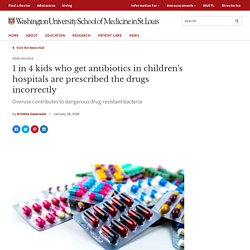
At any given time, about 1 in 3 patients in U.S. children’s hospitals receive one or more antibiotics. However, for one-quarter of those children, the antibiotic treatments are unnecessary or otherwise “suboptimal,” according to research led by Washington University School of Medicine in St. Louis. The research — involving nearly 12,000 children at 32 U.S. children’s hospitals — is published online in Clinical Infectious Diseases, a journal of the Infectious Diseases Society of America. Using Antibiotics Wisely - Choosing Wisely Canada. Penicillin V four times daily for five days versus three times daily for 10 days in patients with pharyngotonsillitis caused by group A streptococci: randomised controlled, open label, non-inferiority study. What are the causes of unnecessary antibiotic prescribing?
GPs see a lot of children with respiratory tract infections (RTIs), usually presenting with a cough, high temperature or both.

RTIs can be distressing and disruptive for children and parents but are mostly viral illnesses that will get better on their own: there is little that a GP can do to treat them. However, many are prescribed unnecessary antibiotics that can lead to resistant bacteria. From our previous research, we know that parents often feel uncertain about the severity of an RTI and feel that it’s safer to consult a doctor. They are usually seeking a medical evaluation, reassurance and information to help them understand and manage the illness. Parents often had a ‘no treatment’ preference, wanting to avoid giving their children unnecessary drugs. Medical evaluation Clinicians confirmed that overt pressure from parents for antibiotic treatment is rare. This may lead clinicians to perceive that parents expect antibiotics, which in turn may influence clinicians to prescribe.
Risk Factors and Outcomes Associated With Treatment of Asymptomatic Bacteriuria in Hospitalized Patients. - PubMed - NCBI. Excess Antibiotic Treatment Duration and Adverse Events in Patients Hospitalized With Pneumonia: A Multihospital Cohort Study. - PubMed - NCBI. Social solutions to antibiotic resistance. Julia Szymczak of Penn’s Perelman School of Medicine likes to head off the obvious question from the outset.

When she gives talks—and she’s given more than 50 during the last three years—she frequently opens the presentation with a slide that reads, “What’s a sociologist doing researching antibiotics?” “My response is that antibiotic use is a great case study to ‘think with’ about more general research questions in medical sociology” says Szymczak, who spent three years studying infection-prevention practices as a postdoctoral fellow at Children’s Hospital of Philadelphia (CHOP).
“It can help us understand how social relationships, group norms, and identity can shape medical decision making, and, ultimately, the quality of care.” Association of Duration and Type of Surgical Prophylaxis With Antimicrobial-Associated Adverse Events. Key Points Question How do the type and duration of surgical antimicrobial prophylaxis affect postoperative outcomes?
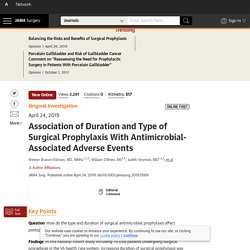
Healio. Oral versus Intravenous Antibiotics for Bone and Joint Infection. - PubMed - NCBI. A Randomized Trial of Prophylactic Antibiotics for Miscarriage Surgery. - PubMed - NCBI. Systematic Review and Meta-analysis of the Efficacy of Short-Course Antibiotic Treatments for Community-Acquired Pneumonia in Adults. - PubMed - NCBI. Antibiotic overuse is high for common urology procedures: Almost 60 percent of patients were prescribed antibiotics in a way that did not follow AUA guidelines. A new study suggests that antibiotics are being overused in up to 60 percent of patients undergoing common urological procedures.

The study, led by Daniel Livorsi, MD, University of Iowa assistant professor of internal medicine, shows that the high rates of overuse were mostly due to extended use of antibiotics following the procedure. The findings were published Dec. 21 in JAMA Network Open. It is common for patients undergoing a urological or any other surgical procedure to be given antibiotics as a precaution to prevent a surgery-related infection. But overuse of antibiotics can promote antibiotic resistance, which the Centers for Disease Control and Prevention has defined as a major health concern. Moreover, unnecessary use of antibiotics exposes patients to potential harm, such as an increased risk of infection by C. difficile bacteria.
Livorsi and his colleagues took two approaches to investigate whether urologists are following the AUA guidelines for antibiotic prescribing. Danish endocarditis strategy halved hospital days. Bmj. Are Latino Cultural Beliefs Increasing Antibiotic Resistance in the US? By Daniela Rebollo Salazar Peer Reviewed In the past ten years, the number of bacterial pathogens resistant to multiple antibiotics has dramatically increased.
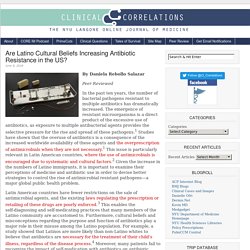
The emergence of resistant microorganisms is a direct product of the excessive use of antibiotics, as exposure to multiple antibacterial agents provides the selective pressure for the rise and spread of these pathogens.1 Studies have shown that the overuse of antibiotics is a consequence of the increased worldwide availability of these agents and the overprescription of antimicrobials when they are not necessary.1 This issue is particularly relevant in Latin American countries, where the use of antimicrobials is encouraged due to systematic and cultural factors.2 Given the increase in the numbers of Latino immigrants, it is important to examine their perceptions of medicine and antibiotic use in order to devise better strategies to control the rise of antimicrobial resistant pathogens—a major global public health problem.
Short-course versus long-course oral antibiotic treatment for infections treated in outpatient settings: a review of systematic reviews. - PubMed - NCBI. 168. Jamanetwork. Question What are the most effective interventions to reduce inappropriate treatment of asymptomatic bacteriuria?
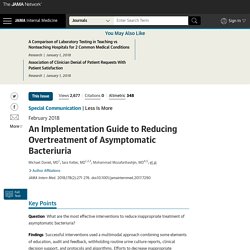
Findings Successful interventions used a multimodal approach combining some elements of education, audit and feedback, withholding routine urine culture reports, clinical decision support, and protocols and algorithms. Efforts to decrease inappropriate treatment of asymptomatic bacteriuria can reduce preventable harm from unnecessary antimicrobial exposure.
Meaning Successful interventions can reduce inappropriate treatment of asymptomatic bacteriuria while improving value and patient safety outcomes. Treatment of asymptomatic bacteriuria (ASB) frequently lacks appropriate indication, yet remains prevalent across settings. Numerous guidelines, professional societies, and campaigns such as Choosing Wisely advocate against this low-value practice. Doctors are finally helping stop superbugs - Blog. With antibiotic stewardship, doctors work with nurses, pharmacists, public health and other health professionals to make sure that the most appropriate antibiotic is prescribed at the right dose, for the right number of days, and only when necessary to fight a confirmed or suspected bacterial infection.

(Shutterstock) The World Health Organization says that superbugs, which are caused by antibiotic resistance, are among the greatest threats to global health. Doctors who over-prescribe antibiotics are a big part of the problem. The U.S. Centers for Disease Control (CDC) estimates that roughly 30 per cent of antibiotics (47 million prescriptions per year) are prescribed unnecessarily in doctors' offices and emergency departments in the United States. Much of them are prescribed inappropriately to treat viruses that cause colds and other viral illnesses, especially in infants and children. A 2016 study showed that stewardship programs improve antibiotic prescribing by doctors. Inappropriate Antibiotic Prescribing 12 Months After Stopping a Stewardship Intervention. Clinical Pharmacy and Pharmacology. Sso.aspx?nfredirect=
Does written information reduce antibiotic use for upper airway infections among people treated in primary care settings? Review question We wanted to find out if written information reduces antibiotic use for acute upper airway infections (colds, sore throats, cough, or earaches).
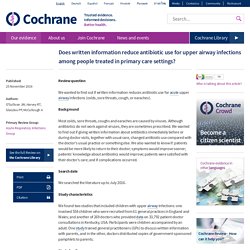
Background Most colds, sore throats, coughs and earaches are caused by viruses. Although antibiotics do not work against viruses, they are sometimes prescribed. We wanted to find out if giving written information about antibiotics immediately before or during doctor visits, together with usual care, changed antibiotic use compared with the doctor's usual practice or something else. Search date We searched the literature up to July 2016.
Study characteristics. Delayed antibiotic prescriptions for respiratory infections - Spurling - 2017 - The Cochrane Library. Delayed antibiotic prescriptions for respiratory tract infections Review question We investigated the effect of delaying antibiotic prescription compared to immediate prescription or no antibiotics for people with respiratory tract infections including sore throat, middle ear infection, cough (bronchitis), and the common cold.
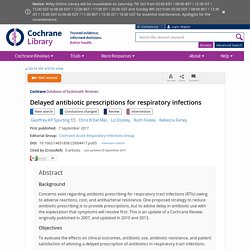
Written information for patients (or parents of child patients) to reduce the use of antibiotics for acute upper respiratory tract infections in primary care - O'Sullivan - 2016 - The Cochrane Library. Plain language summary Does written information reduce antibiotic use for upper airway infections among people treated in primary care settings? Review question We wanted to find out if written information reduces antibiotic use for acute upper airway infections (colds, sore throats, cough, or earaches).
Background Most colds, sore throats, coughs and earaches are caused by viruses. Search date We searched the literature up to July 2016. Why Our Misuse of Antibiotics Could Mean the End of Modern Medicine — truTV.com. The antibiotic course has had its day. The New Antibiotic Mantra—“Shorter Is Better” Peds. Antibiotic Prescribing for Nonbacterial AURIs in Elderly Persons. Patients with colds get inappropriate antibiotics in nearly half of visits to doctors, study suggests - Health. Nearly half of Canadian seniors who go to a family doctor about a cold or other non-bacterial respiratory infection leave with a prescription for an unnecessary antibiotic, say researchers who aim to prevent the public health harm caused by such overuse.
Antibiotics do not work against the viruses that cause upper respiratory tract infections such as the common cold and acute bronchitis. Overuse of antibiotics is a major public health concern, which the United Nations pegs as important in scale as HIV and Ebola. Antibiotic use for emergency department patients with upper respiratory infections: prescribing practices, patient expectations, and patient satisf... Impact of reducing antibiotic prescribing for acute bronchitis on patient satisfaction. Why the advice to take all your antibiotics may be wrong. Ou’ve heard it many times before from your doctor: If you’re taking antibiotics, don’t stop taking them until the pill vial is empty, even if you feel better. The rationale behind this commandment has always been that stopping treatment too soon would fuel the development of antibiotic resistance — the ability of bugs to evade these drugs. Information campaigns aimed at getting the public to take antibiotics properly have been driving home this message for decades.
But the warning, a growing number of experts say, is misguided and may actually be exacerbating antibiotic resistance. article continues after advertisement The reasoning is simple: Exposure to antibiotics is what drives bacteria to develop resistance. The traditional reasoning from doctors “never made any sense. The question of whether this advice is still appropriate will be raised at a World Health Organization meeting next month in Geneva. Antibiotic overprescribing a growing problem. Both studies rely on data from 184 032 ambulatory care visits from the National Ambulatory Medical Care Survey, which samples office-based physicians, and the National Hospital Ambulatory Medical Care Survey, which samples hospital outpatient and emergency departments.
“We knew that misuse was occurring based on local studies,” says Dr. David Hyun, a coauthor of both studies. “But at the national level what surprised us was the vast scale of unnecessary prescriptions, and inappropriate prescription.” These two studies have created “an initial baseline” for further investigations, says Hyun. The workgroup is now combing through data from walk-in community clinics, and long-term care and urgent-care facilities.
An American woman just died from a superbug resistant to 26 different antibiotics - Home. Friday January 20, 2017 A 70-year-old Nevada woman has died after contracting a superbug that could not be treated with any known antibiotic. As microbiologist Dr. Lance Price tells Day 6 host Brent Bambury, cases like this will soon be all too common. "This is a huge problem. In the past, we'd see infections that were treatable with one or two or, maybe if we're lucky, three drugs. The woman at the centre of the story had returned to Reno in August after a long stay in India, where she had been in and out of hospital after breaking her right leg. She died in September. Superbug resistant to all antibiotics killed Nevada woman, doctors say - Health.
A Nevada woman in her 70s who'd recently returned from India died in September from a "superbug" infection that resisted all antibiotics, according to a report released Friday. Duration of Antibiotic Treatment in Community-Acquired Pneumonia: A Multicenter Randomized Clinical Trial. Variability in Antibiotic Use Across Nursing Homes and the Risk of Antibiotic-Related Adverse Outcomes for Individual Residents. Accepted for Publication: April 10, 2015. Corresponding Author: Nick Daneman, MD, MSc, Division of Infectious Diseases, Sunnybrook Health Sciences Centre, University of Toronto, 2075 Bayview Ave, Toronto, ON M4N 2M5, Canada (nick.daneman@sunnybrook.ca).
Published Online: June 29, 2015. doi:10.1001/jamainternmed.2015.2770. Study supports reducing antibiotics for sore throat, ear infections - Health. When family doctors prescribe fewer antibiotics for coughs, colds, sore throats and ear infections, it isn't linked to an increase in the most serious bacterial complications, such as bacterial meningitis, U.K. researchers have found. Prophylactic antibiotics after acute stroke for reducing pneumonia in patients with dysphagia (STROKE-INF): a prospective, cluster-randomised, open...
Addressing the Appropriateness of Outpatient Antibiotic Prescribing in the United States: An Important First Step. An Unsupported Preference for Intravenous Antibiotics. Citation: Li HK, Agweyu A, English M, Bejon P (2015) An Unsupported Preference for Intravenous Antibiotics. PLoS Med 12(5): e1001825. doi:10.1371/journal.pmed.1001825 Published: May 19, 2015 Copyright: © 2015 Li et al. This is an open access article distributed under the terms of the Creative Commons Attribution License, which permits unrestricted use, distribution, and reproduction in any medium, provided the original author and source are credited Funding: AA is funded by a Wellcome Trust Strategic Award (#084538), ME through a Wellcome Trust Senior Fellowship (#076827). Competing interests: The authors have declared that no competing interests exist.
Stop antibiotics: experts. AFTER years of urging patients to finish their full course of antibiotics, GPs are now being encouraged to tell most patients to stop treatment when they feel better. Maryn McKenna: What do we do when antibiotics don’t work any more? Our dangerous overuse of antibiotics. I am privileged to help patients deal with a variety of common disorders such as ear infections, pharyngitis and sinus inflammation.
People suffer a great deal from these problems, especially when they are in the acute phase. The more time spent on listening, the less time spent on prescribing antibiotics in general practice. Interventions to facilitate shared decision making to address antibiotic use for acute respiratory infections in primary care. Delayed Antibiotic Prescribing Strategies—Time to Implement? Intervention to improve the quality of antimicrobial prescribing for urinary tract infection: a cluster randomized trial.